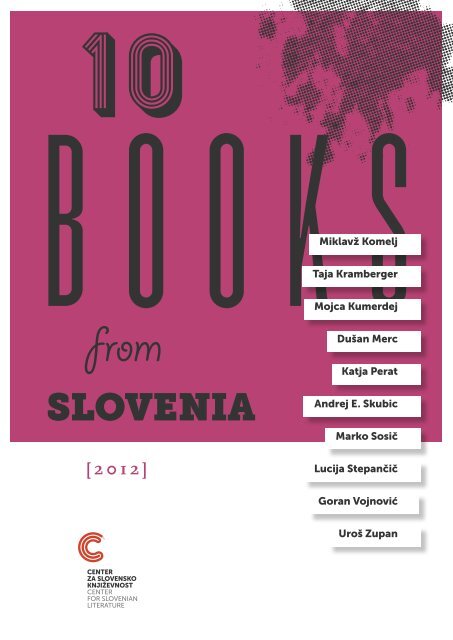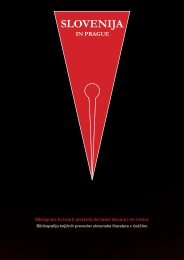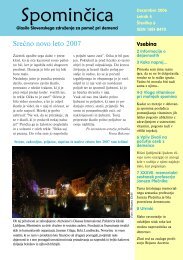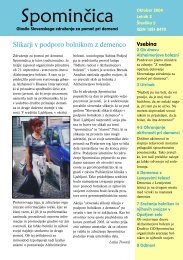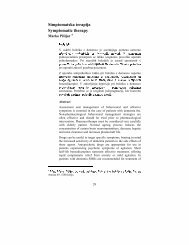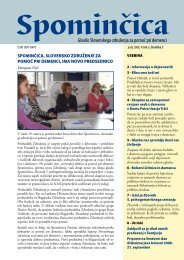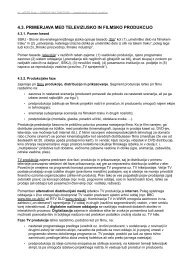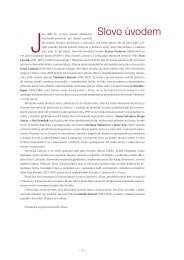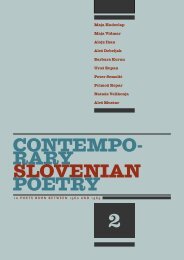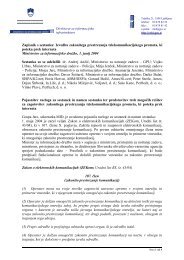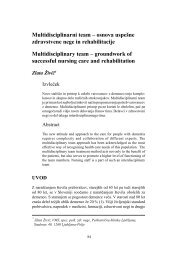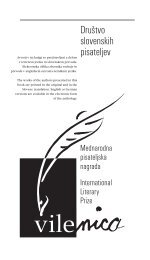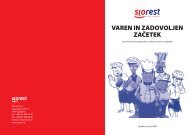10 Books From Slovenia - 2012 - Ljudmila
10 Books From Slovenia - 2012 - Ljudmila
10 Books From Slovenia - 2012 - Ljudmila
You also want an ePaper? Increase the reach of your titles
YUMPU automatically turns print PDFs into web optimized ePapers that Google loves.
<strong>10</strong><br />
BOOKS<br />
Miklavž Komelj<br />
Taja Kramberger<br />
Mojca Kumerdej<br />
from<br />
Dušan Merc<br />
Katja Perat<br />
SLOVENIA<br />
Andrej E. Skubic<br />
Marko Sosič<br />
[<strong>2012</strong>]<br />
Lucija Stepančič<br />
Goran Vojnović<br />
Uroš Zupan
Miklavž Komelj Hands in The Rain<br />
About the author<br />
Photo by Blaž Samec<br />
About the book<br />
Poet, translator, art historian, theorist and critic Miklavž Komelj<br />
received his PhD in Art History in 2002 from the Ljubljana Faculty of<br />
Arts. Between 1999 and 2002, he was junior researcher at ZRC SAZU<br />
(Research Centre of the <strong>Slovenia</strong>n Academy of Sciences and Arts)<br />
and now works as a freelance writer. He is the author of seven poetry<br />
collections: Luč delfina (The Light of the Dolphin, 1991), Jantar časa<br />
(The Amber of Time, 1999), Rosa (Dew, 2002), Hipodrom (Hippodrome,<br />
2006), Nenaslovljiva imena (Unnameable Names, 2008), Modra obleka<br />
(The Blue Suit, 2011) and Roke v dežju (Hands in the Rain, 2011). He also<br />
writes and translates poems and other literary works for children; his<br />
poetry collection Zverinice (Little Beasts) came out in 2006. Komelj’s poems have been published<br />
in every anthology of <strong>Slovenia</strong>n poetry since 1991 and his poetry collections always draw wide<br />
critical attention.<br />
Komelj translates from several languages (Portuguese, Spanish, Italian, Russian, English and<br />
German). He has published numerous academic articles and essays in the field of art history and<br />
theory, literary history and film, as well as a number of critical and polemical writings. He has<br />
published Alternativni vodič po Ljubljani (Alternative City Guide to Ljubljana, 2009), a scientific<br />
paper Kako misliti partizansko umetnost (How to Think Partisan Art, 2009), a booklet on Piero<br />
della Francesca and a collection of essays Nujnost poezije (The Necessity of Poetry, 2011).<br />
Komelj received the Prešeren Student Award (1995) for his undergraduate thesis on the sculptor<br />
Francesco Robba and the ZRC SAZU gold medal (2002) for his doctoral thesis; his poetry<br />
collections have won him the Veronica Award (2002), Jenko Award (2006), Župančič Award<br />
(2009) and the Prešeren Foundation Award (20<strong>10</strong>). In 2011, he also received the Rožanc Award for<br />
his collection of essays The Necessity of Poetry.<br />
The collection Hands in the Rain – form-wise, probably Komelj’s most heterogeneous poetry<br />
collection to date – explores various situations, whether they be experienced, historical or<br />
fictional, with impressive erudition and poetic need. It brings together a number of different<br />
voices and registers, all interacting with one another in unexpected ways. More than ever, one<br />
senses Komelj’s concern for proper acceptance of the Other, which the poet approaches in<br />
distinctive dialectic sequences. The difference between silence and no longer being able to<br />
speak is the gap which Komelj’s poetry, not only in Hands in the Rain, tries to widen, in order to<br />
enter the realm of new possibilities. This gap appears when the self realizes its most deep inner<br />
conflict, in which one is confronted with his own otherness. And it is precisely this action that<br />
makes Komelj radical, as no attempt which would favour the surface through affirmation gets<br />
past him: his poetry questions the name and the identity behind it, the pain and its indefinable<br />
ideology, the subtleness and its inherent brutality, when it constitutes the opposite to brutality.<br />
However, in his poetry, Komelj offers the right to exist to a variety of feelings and relationships<br />
with unsurpassable precision and imagination of language in spaces of poetry, that are only<br />
beginning to open up. For only there can the individual be accepted with dignity. This is the<br />
concern that Komelj’s poetry sets as its basic guiding principle.<br />
2<br />
Excerpt<br />
Translated by<br />
Jack Hirschman<br />
with Diletta Torlasco,<br />
using the Italian<br />
translation of Ravel<br />
Kodrič<br />
Hands in the Rain – The Sickle and Hammer of Tina Modotti<br />
Pounds and pounds again. Pounds and pounds again.<br />
Not the heart. The hammer that forges.<br />
This tender naked body.<br />
Not the heart. The hammer that forges.<br />
That forges an amorphous emptiness
to shape a spot distinct as a bullet,<br />
that transforms the sickle<br />
into a question-mark<br />
then the question-mark vanishes and changes<br />
into a hard, graspable<br />
sickle.<br />
Whose hard grasp-ability<br />
is due to its photographic form.<br />
The ecstatic pang<br />
that to the view lacks the hands<br />
for the blade for that potential slah<br />
that can be felt on the tongue.<br />
In photography.<br />
Tina Modotti even<br />
gave up photography.<br />
(I’m writing this to her during a solar eclipse.<br />
During an imperceptible<br />
partial solar eclipse<br />
at noon.)<br />
An absolute renunciation. And at the same time:<br />
accompanied by festive sounds.<br />
(“I think about the great chats together<br />
with good coffee,<br />
/better because one drank it together/, near the phonograph<br />
/transformed in to a fox – Felicita<br />
knows the whole story/ and think<br />
about Toio’s legs doing a pirouette<br />
to the sound of Rumba.”)<br />
Scratchy sounds.<br />
It’s not about bloody iron,<br />
but of blood that oozes from the iron.<br />
This tender naked body<br />
is of iron.<br />
Contact for<br />
translation rights:<br />
Miklavž Komelj<br />
Bratovševa ploščad 18<br />
<strong>10</strong>00 Ljubljana<br />
Of iron or steel?<br />
Of a special substance.<br />
Made of vapours. Vaporous<br />
glooms. Of quicksilver.<br />
3
Taja Kramberger <strong>From</strong> The Edge Of A Cliff<br />
About the author<br />
About the book<br />
Photo by A. C.<br />
Taja Kramberger, born in 1970 in Ljubljana, is a poet, translator and<br />
essayist and has a PhD in History and Historical Anthropology. She lives<br />
and works in Koper, a seaside town near Trieste. She is active in the<br />
fields of literature, social sciences and involved in the struggle for civil<br />
rights. Up to date, she has published – as author, co-author, editor or<br />
translator – around 60 publications, among them 38 journal issues in<br />
social sciences and culture, three monographs, four literary and scientific<br />
collections of various texts, translations of five literary works, nine<br />
books of poetry and two children’s books. Her poems have appeared in<br />
numerous literary anthologies and journals in <strong>Slovenia</strong> and abroad. As<br />
president of Collegium artium at the Faculty of Humanities in Koper, where she worked between<br />
2004 and 20<strong>10</strong>, she organised more than <strong>10</strong>0 cultural and academic events and was co-author of<br />
the entire Historical Anthropology programme (12 courses). She has been shortlisted six times<br />
for various literary awards and received the Veronika Award in 2007. Together with poets Tatjana<br />
Jamnik and Barbara Korun, she co-founded the KONS International Literary Award ® , which<br />
recognises the literary opus of individual authors, their personal ethos and lifelong engagement<br />
and overall contribution to the welfare of all people.<br />
The book was written after a difficult period in the poet’s life, when, firstly, she was unlawfully<br />
dismissed from her university post as a teacher, secondly, she experienced further political<br />
pressures, lawsuit threats and was the subject of intrigues by her literary colleagues (part of<br />
the university purge behind the scenes), and thirdly, her mother died. In poetic language, <strong>From</strong><br />
the Edge of a Cliff reflects not only individual struggles, but also the overall, broader social<br />
situation and the overlapping of both levels at that time. Taja Kramberger was invited to the newly<br />
established faculty of humanity studies in Koper in 2004, together with D. B. Rotar, to prepare<br />
and develop the programme of Historical Anthropology. In addition to that, they did unpaid work<br />
on a number of other things for the benefit of the academic community. In 20<strong>10</strong>, the faculty and<br />
university authorities – who wanted to turn the university into an enterprise all along – suddenly<br />
decided, in the name of the “rationalisation of personnel”, to get rid of critical academics and the<br />
most capable and engaged individuals, who helped to establish the academic infrastructure in<br />
the previous years. In the case of T. Kramberger, who lost her job, many students and residents<br />
of Koper protested loudly and publicly, drew up a petition, sent protest letters to the rector and<br />
the dean, and set up a website (http://resimouniverzo.blogspot.com/). But no concrete results<br />
followed. Later on, the court awarded her damages and she wrote a book of poetry on the<br />
subject.<br />
4
Excerpt<br />
Translated by<br />
Taja Kramberger<br />
and Špela Bibič<br />
<strong>From</strong> the Edge of a Cliff – Every Dead One Has A Name<br />
Every dead one has a name,<br />
only the names of the living make us falter.<br />
Some names are impossible to utter<br />
without a stammer and a fidget,<br />
some can only be pronounced through allusion,<br />
and some, mostly women’s,<br />
are forbidden in these places.<br />
Every dead one has a name,<br />
engraved in stone,<br />
printed in obituary or directory,<br />
only my name has to be tarnished,<br />
every few years<br />
smeared and substituted<br />
with another one.<br />
A decade ago<br />
a high-ranking party official warned me:<br />
Stay a poet, as long as there’s still time for that.<br />
Still time?<br />
Time for what?<br />
I’ve also become a social scientist,<br />
an editor, an organizer<br />
a translator, an activist<br />
and a university teacher.<br />
Unbearable – all these things –<br />
all trespasses of the old land borders<br />
which had been delineated by the dirty<br />
fingers of fraternities.<br />
I air all the rooms,<br />
I ignore all ratings,<br />
I open all the safety valves.<br />
And they have put me –<br />
like the dead – out in the cold.<br />
But every dead one has a name.<br />
Contact for<br />
translation rights:<br />
Taja Kramberger<br />
taja.kramberger@gmail.com<br />
5
Mojca Kumerdej Dark Matter<br />
About the author<br />
Photo by Jože Suhadolnik.<br />
About the book<br />
Mojca Kumerdej, writer and art critic, mainly in the field of dance,<br />
was born in 1964 in Ljubljana. She studied Philosophy and Sociology<br />
of Culture at the Ljubljana Faculty of Arts. Since 1998, she has been<br />
contributing regularly to academic and art magazines, such as Problemi,<br />
the former Razgledi and Maska, and particularly to Delo newspaper,<br />
where she publishes insightful columns, articles, interviews and<br />
critiques recording the developments in contemporary dance, theatre,<br />
performing arts, film and literature.<br />
In 2001, she published her first novel Krst nad Triglavom (Baptism<br />
over Triglav), the short story collection Fragma in 2003 and her most<br />
recent short story collection Temna snov (Dark Matter) in 2011. Her short prose has been<br />
translated into German, English, French, Serbian, Russian, Czech, Spanish and Hungarian.<br />
The collection Dark matter took a long time to ripen. It is written in a precise, controlled<br />
language, never letting on that it was snatched from silence. In astronomy, dark matter is invisible<br />
and recognisable only through its effects. Likewise, in her new collection, Mojca Kumerdej<br />
does not portray shocking intrusions into everyday life directly, but rather articulates them in a<br />
polyphony of authentic voices that these events have marked. With psychological subtlety, she<br />
unveils the thin line between personal freedom and various attempts at cohabitation in a society<br />
that tolerates no deviations or creativity and tries to reduce the human being to the level of a<br />
robot, biological matter or his TIN. The main focus of attention is again the body, struggling to<br />
overcome thanatos with eros, confronted again and again with its limitations and transience.<br />
Most importantly, what Mojca Kumerdej brings into <strong>Slovenia</strong>n prose, in addition to her analytical<br />
sharpness and her brilliant, juicy language, is a component that is all too rare: intelligent humour.<br />
<strong>From</strong> the foreword by Amalija Maček<br />
The short story collection Dark matter is a modernistically moulded literary cast of the world<br />
which the modern individual has found himself in; on the one hand, the boundaries of his<br />
freedom have greatly extended, but on the other, he is suffocating under the stiff social norms<br />
and biological limits, mainly death.<br />
<strong>From</strong> the review by Sandra Krkoč in Dnevnik<br />
6
Excerpt<br />
Translated by<br />
Gregor Timothy Čeh<br />
Contact for<br />
translation rights:<br />
Beletrina Academic<br />
Press<br />
Ljubljana, <strong>Slovenia</strong><br />
info@zalozba.org<br />
renata@zalozba.org<br />
Dark Matter – Hepatica<br />
I didn’t see any operations or any surgeons bending over my dead body, poking around it with<br />
scalpels or sticking any useful parts of my body matter into anyone else. The next moment<br />
of awareness, or to be precise self-awareness – and it seems that there is in fact little but selfawareness<br />
left – only switched on much later. At least ten days must have gone by, but to me<br />
it is all blank. I remember suddenly becoming aware on what seemed like a hospital bed. The<br />
thought that first sprung out of the re-activation of my awareness was Where am I? It seems<br />
that I had an accident, but was lucky at the same time, since I obviously survived. In the next<br />
moment, when I checked out the state of my limbs, I realised in horror that perhaps I wasn’t<br />
so lucky after all. This was the first serious bad turn. Only at that point did I realize that my<br />
perception of space was somehow changed. I could sense my surroundings, but the angle at<br />
which I saw things somehow didn’t seem right. If I’m lying on a bed, I logically assumed, I<br />
should, when I open my eyes, be seeing the walls and the ceiling. But I wasn’t. My field of view<br />
– maybe the better term would be re-view! – was warped in a manner I imagine space distorts<br />
at the extremities of the universe. Before I even tried to move my head, arms and legs, I could<br />
hear a snoring sound. It wasn’t next to me; it seemed to be coming from some suspiciously<br />
close proximity from which I deduced that I was far from alone in the room or on the bed.<br />
And, as I soon discovered, things are likely to stay this way. Though I could actually sort of feel<br />
my arms and legs, I suddenly realised that the reason I could not move them is because I no<br />
longer have either arms or legs, not to mention a head. How terrifying, nevertheless surely only<br />
temporary, I thought. After all, humans can feel a whole load of things that turn out not to be<br />
true beyond the actual neurological process that, for god knows what reason, manipulates and<br />
distorts our perceptions. But I never expected myself – someone who always swore by logic and<br />
was always astonished by the laziness and liability of those whom life throws about like a small<br />
boat on rough seas – would find myself in a state that closely resembles psychosis. This feeling<br />
only increased when a nurse entered the room and came towards me. Well, towards something,<br />
though not literally towards me. She played about with a thermometer, poking it into something<br />
outside my field of view. Who am I? What am I? I kept asking myself, but asking as what? What<br />
is myself? Where from? What am I listening, thinking and observing all this as? All these questions<br />
started eating away at me and I had no way of knowing whether they will remain unanswered<br />
in the future. What is this thought entity – and me with it, my identity, attached to? To what<br />
kind of matter? I suddenly became furious and scared; surely it must be attached to something?<br />
I’m not just a spirit or something, am I? For me, a scientist whose remains were reduced to<br />
some kind of scientific phenomenon, this was absolutely too much to handle.<br />
The nurse took the temperature. I gathered this from the electronic thermometer she raised<br />
up to her pointy nose a moment later when the doctors making the rounds marched into the<br />
room. Salvation at last; here come my scientific colleagues who have come to explain my state<br />
to me and tell me what I can expect – well, of course, in as much as “scientific” is the right<br />
expression for hospital staff who frequently just become arrogant, lazy routine-practitioners<br />
with little real interest in science.<br />
But the rounds began to address me with a name and surname totally unknown to me,<br />
and when the surgeon began to explain to the mysterious bearer of the unfamiliar name that<br />
the operation had been entirely successful and that his body had accepted the donor liver well,<br />
I realized I was in deep shit. Or, more precisely – allow me to express myself metaphorically<br />
in this instance – that shit all remained of me after the accident, something the transplant<br />
experts were truly glad of, because they could diagnose without any further reservations that I<br />
was brain dead and keep my body on life support for just as long as was needed to extract any<br />
undamaged organs and then, as per my own instructions, send the remaining pulp of tissue off<br />
to the crematorium, meaning it has by now probably already had a decent burial. The liver, or at<br />
least the liver, had been transplanted into the man inside whose body I now live as his new liver.<br />
7
Dušan Merc A Pedagogical Triptych<br />
About the author<br />
Photo by Jože Suhadolnik.<br />
About the book<br />
Dušan Merc, born in 1952 in Ljubljana, graduated in Comparative<br />
Literature and has been the headmaster of the Prule Primary School in<br />
Ljubljana for the past twenty years.<br />
Even though he started publishing rather late in life, his mature<br />
writing years have turned out to be extremely fruitful, as he has published<br />
twelve novels, dealing with historical, as well as contemporary topics:<br />
Galilejev lestenec (Galileo’s Chandelier, 1996), Sarkofag (Sarcophagus,<br />
1997), Slepi potnik (The Stowaway, 1999), Potažba (Consolations, 2001),<br />
Čista ženska (A Pure Woman, 2002), Jakobova molitev (Jacob’s Prayer,<br />
2003), Potopljeni zvon (The Sunken Bell 2004), Šesta knjiga sanj (The<br />
Sixth Book of Dreams, 2006), Dantejeva smrt (Dante’s Death, 2007), Ne dotikaj se me (Don’t<br />
Touch Me, 20<strong>10</strong>), Pedagoški triptih (A Pedagogical Triptych, 2011) and Planet žensk (The Planet<br />
of Women, 2011). Although the author seems to be more at home with more extensive works<br />
of prose, he has also added three short story collections to his body of works: Golo mesto (The<br />
Barren City, 2003), Pega v očesu (A Spot in the Eye, 2004) and Akacijev drevored (Acacia Avenue,<br />
2006). One of his stories was also featured in Poletje v zgodbi (Summer in a Story, 2002), the<br />
supplement of the Delo newspaper.<br />
A year after its publication, Galileo’s Chandelier, translated into German in 2002, was<br />
nominated for the Kresnik Best Novel of the Year Award. Merc has been nominated for the<br />
Kresnik Award numerous times and two of his novels made it onto the shortlist.<br />
In his novels, he likes to explore historical topics (Jacob’s Prayer, The Sunken Bell), as well as<br />
current existential issues (The Stowaway, The Sixth Book of Dreams); he draws inspiration for his<br />
stories mainly from ordinary, everyday incidents and discords between partners, often featuring<br />
the character of his domineering, authoritative mother; he is especially interested in all kinds of<br />
anomalies and instinctual impulses.<br />
A Pedagogical Triptych is a personal account of a primary school headmaster; it is his<br />
confrontation with himself and the people around him in the hypocritical world of pedagogy.<br />
The education methods from the times of the old regime have left such a deep mark on the<br />
headmaster that he sees nothing but pedagogical evil all around him. Thus, his writings ruthlessly<br />
uncover the secrets of the pedagogical sphere, which wants to get rid of him, the backwardness<br />
and affected nature of parents, who egocentrically and fanatically defend the rights of their brats,<br />
express his frustration over the moralising, blabbing and prattling of hysterical women teachers in<br />
the staff, fully expose the splendour and misery of the annual headmasters’ and headmistresses’<br />
meeting at a hotel by the sea, where whole brigades of pedagogical authorities from all parts of<br />
<strong>Slovenia</strong> flock to and where, on every such occasion, political pedagogy is portrayed as a mistake<br />
and a lie.<br />
8<br />
Excerpt<br />
Translated by<br />
Špela Bibič<br />
A Pedagogical Triptych – Primary Schools in <strong>Slovenia</strong>, Day 1<br />
At these kinds of conferences, one usually senses the silent essence of the <strong>Slovenia</strong>n educational<br />
system (for everything is feminised), pervading the conference and the pedagogy in <strong>Slovenia</strong><br />
– they feel neglected, no one pats them, no one pays any attention to them, no one pays them a<br />
compliment, neither on their dress, nor their hair, no one bows before their femininity. What’s<br />
more, they are sexually silenced, most of them at least, suppressed and neglected, most of them<br />
at least, they don’t even see themselves in the mirrors of their expensive hotel rooms, most of<br />
them at least. Does this problem concern the running of a school? Why shouldn’t it? If they<br />
were to be, that would be something at least, exploited from time to time, sexually exploited,<br />
they might feel better.<br />
In such a luxury hotel, some pedagogical headmistress ladies take full advantage of the<br />
sauna, all kinds of massages, the hairdresser, spa-massage baths – they let themselves be
pampered, as they say and as the hotel advertisement says and as the television and various<br />
series teach them. Adding, in a most affected manner: “this is for the soul.”<br />
Like real daily exploited housewives in their own homes, they punish the staff, the same way<br />
they are punished themselves, whenever possible – they let their luggage be carried, because<br />
back home, they constantly drag grocery bags around, so their arms are half-stretched, to live<br />
comfortably, they throw all the towels on the hotel bathroom floor every day, demand new<br />
ones, their rooms are messy and dirty, they turn into their husbands, not cleaning up after<br />
themselves, they mess everything up, behave irresponsibly towards the environment, they mock<br />
the people around them, the same way they are mocked themselves – they are real princesses<br />
now. Whatever you do, don’t make them hate it by saying this is included in the price that the<br />
school pays, so that you can go to the conference. They apply mascara, or whatever it is they use,<br />
all over their faces, they put on liquid powder, which looks like plaster of an old shack from upclose,<br />
they put fake claws over their nails to make themselves more lady-like – and all they say<br />
is: “It’s all paid for.” Whatever you do, don’t pull their prosopopoeial mask off. They don’t get<br />
paid at home, back home, they are slaves.<br />
And some of them stay modest and humble teachers, keep strictly within the boundaries of<br />
their own world, so that they, god forbid, wouldn’t be too extravagant, wouldn’t step out of their<br />
modest, housewife nature, and don’t treat themselves to anything except the sunset, which is so<br />
beautiful, stunning, romantic at the seaside, one really feels lucky to see the sun go down and<br />
is rewarded, just like that, you have been bestowed with something universal and you’re happy,<br />
something like that really can be beautiful, like in some picture. Their rooms are tidy, they<br />
keep everything clean, so that the poor cleaning ladies wouldn’t have too much work, so that<br />
they wouldn’t think badly of them, but would speak well of them – these sure are tidy and neat<br />
people. So educated and so modest. They sit through all those lectures, seminars – workshops<br />
they call them – make notes and try to remember everything, after they have put their rooms in<br />
order and made the bed, tucked in the sheets, as if the room was unoccupied, and cleaned the<br />
bathroom after themselves. They feel good about having everything so tidy. They are unable to<br />
detach, despite the intellectually demanding workshops, unable to detach themselves from their<br />
tidy rooms. They will, of course, never order any room service. They will get what they need<br />
themselves. To take anything from the fridge in the room would be a sin and an extravagancy.<br />
Some of them, if there is a brave man among the headmasters and their inner need turns<br />
out to be too great, even let themselves do it or that, it is taken care of, right? Right, right, says<br />
Jože the headmaster to himself, stretching in his expensive lair. His Self also agrees. The<br />
formal dinner that Jože is going to, along with his repressed, disgraced, humiliated Self, which<br />
only comes out in the hotel room, after it puts on his body, is always the same – the formal part<br />
concludes with the dance of the president of the special headmasters’ association, a humble and<br />
timid civil initiative of pedagogues within the militant state pedagogy, we could say. It doesn’t<br />
fight it nor causes trouble, it is its subordinate counterpart, this civil initiative. That is what it<br />
was established for, to support – this militant pedagogy. It turns out that the president always<br />
dances like he was taught in dance class in his final year of primary school. Mechanically,<br />
awkwardly, clumsily, stiffly and ceremoniously, with a particular, appropriately smug expression<br />
on his face, a mask (he too has mastered the art of prosopopoeia, in order to survive), behind<br />
which hides fear, great fear of messing up his footwork, of taking a step in the wrong direction<br />
and the minister would see it, notice it, this minister, the current minister, whichever minister.<br />
And so, quite befitting a headmaster – with no inner rhythm, rigorously and consistently as<br />
is right, he dances his dance of a headmaster champion. Well, there is no sin in that, whether<br />
everything is done right or everything is done wrong.<br />
Contact for<br />
translation rights:<br />
Beletrina Academic<br />
Press<br />
Ljubljana, <strong>Slovenia</strong><br />
info@zalozba.org<br />
renata@zalozba.org<br />
9
Katja Perat The Best Have Fallen<br />
About the author<br />
Photo by Katja Perat.<br />
About the book<br />
In 2006, Katja Perat (1988) enrolled at the Faculty of Arts, the<br />
Department of Philosophy and the Department of Comparative<br />
Literature, where she is currently attending her final year of studies. Since<br />
2009, she is an active editorial board member of the student literary<br />
magazine Idiot, where she publishes her poetry. Since 2007, her poems<br />
have also appeared in Literatura magazine (September 2007, vol. 19,<br />
no. 195 and November 2008, vol. 20, no. 209). One of her poems was<br />
published in Dvignimo pero – a bilingual collection of prose and poetry<br />
of young authors from <strong>Slovenia</strong> and Bosnia and Herzegovina, as part<br />
of the Treći novosarajevski književni susret in the organisation of the<br />
Association for Culture – Novo Sarajevo. Since 20<strong>10</strong>, she is a literary critic for the Literatura<br />
magazine, as well as the cultural bi-weekly Pogledi. In 20<strong>10</strong>, she was a regular correspondent<br />
for the student newspaper Tribuna. Her first poetry collection Najboljši so padli (The Best Have<br />
Fallen), which came out in 2011, was nominated for the Veronika Award and received the Award of<br />
the <strong>Slovenia</strong>n Book Fair for Best First Book.<br />
I think it was Boris Pasternak who said: “Who said I like poetry? Verses I cannot stand.”<br />
Miklavž Komelj does not consider Pasternak’s thought a mere rhetorical witticism, but rather a<br />
demonstration of consistency of his love of poetry. I believe the criticism of Katja Perat’s poetry is<br />
a sign of precisely this kind of consistency, the consistency of feelings she might have for poetry,<br />
as well as of her attitude towards the work and the role of the poet. “It is not poetry I need, / But<br />
professional help.” Which poet can we trust, if not the one who is not ashamed of asking herself<br />
publicly if she might have fallen victim to one of the most elusive and insidious diseases of<br />
contemporary poetry – her own phantasms and personal traumas, masquerading as poetry.<br />
Entering the literary system today, Katja Perat is certainly not a typical representative of the<br />
youngest generation of writers and brings into the literary arena a new story with new emphases,<br />
a distinct view of the world that has in fact been around for quite a while, yet has so far been<br />
prevalent on the street and at home. Katja Perat definitely does not belong among her very polite<br />
generation that speaks well, writes well, talks well and, above all, behaves well. We are not saying,<br />
of course, that we have not seen this in poetry before and elsewhere, but at the moment, Katja<br />
Perat is the biggest name of literary system disobedience, of vigorous protest against boredom<br />
(in a time when everything is amazing), of relentless persecution of collective delusions,<br />
insusceptibility to fascinate and being fascinated, contempt for egotism and seriousness,<br />
resistance to bribery when it comes to big ideas, enjoyment of the freedom of spirit, of faith in<br />
youth as the positive opposite of what comes after it.<br />
<strong>From</strong> the foreword by Mojca Pišek<br />
<strong>10</strong>
Excerpt<br />
Translated by<br />
Jasmin B. Frelih<br />
The Best Have Fallen – Engels<br />
I can say with certainty,<br />
that the only man who could love me without forcing himself,<br />
is Friedrich Engels.<br />
There is a silent treaty among subordinates;<br />
that at all times of the day,<br />
without obligation,<br />
and without a shutterbug, who would cram that moment into eternity,<br />
they can place their heads into each other’s lap,<br />
and summon comfort.<br />
I go to the bathroom,<br />
to fix my hair and smudged mascara.<br />
I bump into a flock escaped from history text-books.<br />
They drift in a long line along the narrow hallway.<br />
They jostle past each other,<br />
as if there was revelation at the end, or at least some blueberry pie.<br />
I feel uncomfortable,<br />
when Robespierre grabs my collar and pushes me up against the wall,<br />
so my feet dangle ten centimetres above the ground.<br />
Angry lad.<br />
So much blood spilled for freedom of speech, and now we’re all silent.<br />
Nobody feels a sense of calling.<br />
We’re making out with other losers in corners.<br />
Nobody wants to lay out a plan for a better tomorrow.<br />
There is no überman<br />
that would suddenly appear and save the day.<br />
I feel sorry for Robespierre.<br />
His essay against capital punishment was good.<br />
With the edge of my palm I move along his face.<br />
He is not beautiful and many times he was wrong.<br />
Yet I am full of compassion, when he stands before me so upset.<br />
We are equal before law,<br />
but he needs explaining,<br />
that equality, as all on Earth,<br />
has its limit, one that is thin and hardly visible.<br />
He can’t take me with him.<br />
I go back to Friedrich –<br />
there is nothing great about him.<br />
I seek refuge in his kind subordination,<br />
as orthodox Jews seek refuge in the shadow of His wings.<br />
Contact for<br />
translation rights:<br />
Beletrina Academic<br />
Press<br />
Ljubljana, <strong>Slovenia</strong><br />
info@zalozba.org<br />
renata@zalozba.org<br />
11
Andrej E. Skubic How Much Are You Mine?<br />
About the author<br />
Photo by Jože Suhadolnik.<br />
About the book<br />
Andrej E. Skubic was born in 1967 in Ljubljana. He graduated from the<br />
Ljubljana Faculty of Arts and received his PhD in Sociolinguistics in 2004.<br />
Since 2004, he works as a freelance writer and translator.<br />
He started publishing short stories in 1989. In 1999, he published his<br />
debut novel Grenki med (Bitter Honey), winning the 2000 Kresnik Novel<br />
of the Year Award. Since then, he has published three novels (Fužinski<br />
bluz – Fužine Blues, 2001, Popkorn – Popcorn, 2006, Lahko – You Can,<br />
2009), a short story collection (Norišnica – Madhouse, 1994) and a<br />
monograph on sociolinguistics (Obrazi jezika – Faces of Language, 2005);<br />
he has written TV scripts, radio and theatre plays and edited several<br />
anthologies. He has translated over 20 books by Scottish, Irish, American and Nigerian authors<br />
(notably Flann O’Brien, Samuel Beckett and Ken Saro-Wiwa). In 2007, he received the Sovre<br />
Award (granted by the national Literary Translators’ Association) for his translations of James<br />
Kelman and Gertrude Stein.<br />
His books have been translated into Czech (Bitter Honey, Fužine Blues), Serbian (Popcorn,<br />
Fužine Blues) and Croatian (Popcorn); his stories were published in literary magazines in several<br />
languages and widely anthologised, both nationally and internationally.<br />
His latest novel Koliko si moja? (How Much Are You Mine?, 2011) won the <strong>2012</strong> Prešeren<br />
Foundation Award (national award for cultural achievement).<br />
After his girlfriend becomes pregnant with another man, Tomo Veis is devastated; he leaves the<br />
city and moves to “the old family homestead”, where he intends to write film scripts in peace.<br />
But the next few months have several temptations in store for him. After a not-so-accidental<br />
meeting with his former girlfriend, he embarks on an uncertain journey of helping her with<br />
the problematic pregnancy, which brings them closer together against his will. On the other<br />
hand, his peaceful stay in the countryside is disturbed by a conflict with the neighbour, who has<br />
appropriated a piece of the family land after the border river changed its course decades ago. As<br />
he struggles to solve the mounting problems, assisted by various locals of doubtful loyalties, the<br />
history of his family is gradually revealed – and it is not quite the same as the one he learned from<br />
his relatives. In fact, he himself turns out to be different than he thinks he is. All that is left for<br />
him to do is clear his own good name.<br />
The novel focuses on the human love of possession – and the possessiveness of whom we<br />
love.<br />
12<br />
Excerpt<br />
Translated by<br />
Špela Bibič<br />
How Much Are You Mine?<br />
– Wait a minute, listen, Anja, I said slowly, slowly coming back into the picture. – Ok, I don’t<br />
know what it is, but shouldn’t we just like …<br />
If I had said these words with a little more conviction, everything could have turned out<br />
differently.<br />
– No, this isn’t the time, she said. – This isn’t the right time. We’ll have plenty of time later.<br />
Go now, leave!<br />
The look on her face was bordering on insane, completely at odds with her usual self, and<br />
so far gone it really freaked me out. This wasn’t the woman I had coffee with this morning. I<br />
drank my coffee and went to prep for editing. But here was just another broad from Studenec<br />
during a psychotic episode, during – I don’t know, something so out of my world, there’s no way<br />
I could deal with this right now. I should have slapped her around a bit, I know, but how could<br />
anyone slap such a sexy long-legged woman? She might have calmed down then and we could<br />
talk. But I didn’t.<br />
– Just get back here, she was saying, as I was putting on my shoes again. – Don’t go.<br />
I stood up.
Contact for<br />
translation rights:<br />
Andrej E. Skubic<br />
a.skubic@gmail.com<br />
Beletrina Academic<br />
Press<br />
Ljubljana, <strong>Slovenia</strong><br />
info@zalozba.org<br />
renata@zalozba.org<br />
– Go now, just come back later, she said. – I mean, not like this, don’t leave.<br />
– Fucking hell, I said and had my jacket back on in record time, even though I was just<br />
about to slap her anyway, because that would be an appropriate way to say goodbye. This has to<br />
be the most moronic thing the world has ever seen.<br />
– Come back, she kept saying, when I was already standing out in the corridor like an idiot<br />
and she was holding the door ajar, with only her head sticking out, illuminated by the light<br />
behind her, so I couldn’t even see her face. – Come back, I mean it.<br />
– Whose is it then? I asked again, because I managed to work out a few concepts while I was<br />
putting on my shoes and clothes.<br />
– It’s not yours, she said flatly and slammed the door; then all I could hear was the sound of<br />
locks turning, three at the bottom, two at the top. I’ll bet she left the keys in the door.<br />
When I left, I forgot my cigarettes and phone on the cabinet by the door. I had taken them<br />
out of my pocket when I came home. Good thing I didn’t take out my wallet as well.<br />
I drank two beers right by the apartment building, at the bar next to the Mercator<br />
supermarket. I was really upset. I thought of going back and banging on the door, but what<br />
if she still wouldn’t let me in? The door can’t be broken down, we had an anti-theft model<br />
installed, and there’s no point in making a scene in the corridor and making a fool of myself.<br />
But I could call her, I thought. I had to call information first to get our home phone number –<br />
after all, who actually knows his home phone number these days? The bartender was looking<br />
at me like I was the eighth wonder of the world, but he too must have remembered the times<br />
when we didn’t have mobile phones and had to ask the bartenders if we could make a phone call<br />
at the bar: hey, I’m having a drink here, I can’t come, but you can come here if you feel like it.<br />
Those were the days.<br />
– What the hell were you thinking, acting like that? I yelled into the answering machine. –<br />
Come on, call the bar and say it’s for me. Or come here.<br />
On hearing this, the bartender said nothing, only tried to stay clear of my table, where I<br />
sat cursing to myself, staring at the door. I was getting more and more agitated and pissed off.<br />
Only one third of this fury was due to the otherwise root cause of everything: the fact which<br />
had somehow gotten to me by then, which was that she was basically telling me that she had<br />
cheated on me, betrayed, actually physically mated with another guy, and without a condom,<br />
the fucking bastard (and then let me fuck her – so I could catch some shitty disease myself?).<br />
That was just one part of it, maybe even the smallest one for that matter, because the girl had<br />
obviously gotten herself into some deep shit which completely messed her up and I would want<br />
to help her in that case anyway, I guess she’s really shaken up about all of this and that she’s<br />
sorry. And two thirds of it was how she did it, how she kicked me out, how she treated me, like<br />
it wasn’t even my business, our business – that’s because women see everything as a woman’s<br />
thing, controlling your own body, all of this is just theirs, the whole world is one big woman, and<br />
that’s her, we only get a job to do every now and then, like: “go out and come back later.” How<br />
the fuck could she blow me off like that? There’s no other word for it.<br />
So after four beers, my phone call went something like this:<br />
– Tomorrow at noon, the flat will be empty because I’m coming to get my stuff. Unless you<br />
call the bar in the next five minutes, the number is …<br />
The phone didn’t ring that night, not even after the sixth beer.<br />
I spent the night in a hotel. The room looked remarkably like some room in Patras, Toronto,<br />
Berlin, Lisbon … I gave the receptionist such a look he didn’t dare to make a sound.<br />
I didn’t slap her around. That’s only one in a long list of my mistakes.<br />
The next morning, when I went to pick up my stuff in the company van, my biggest fear<br />
was finding her hanging from some curtain rail, while listening to all my crap from yesterday<br />
booming from the answering machine: “If you don’t call me at the bar …” dramatic pause,<br />
“there’s gonna be trouble.” Obviously, she wasn’t hanging from the rail or any other thing; she<br />
wasn’t there at all.<br />
13
Marko Sosič <strong>From</strong> Earth And Dreams<br />
About the author<br />
Photo by Agnese Divo<br />
About the book<br />
Marko Sosič, born in Trieste on 22 December 1958, writer and director.<br />
He graduated in Directing from the Academy of Dramatic Art in Zagreb<br />
(1984). He has directed at various <strong>Slovenia</strong>n and Italian theatres, as well<br />
as for television. He is the author of a number of radio plays, which he<br />
recorded for the <strong>Slovenia</strong>n radio in Trieste. He started publishing short<br />
prose in the late 1980’s in Sodobnost and Mladje magazines. He was<br />
artistic director of the Slovene National Theatre Nova Gorica, as well as<br />
the Slovene Repertory Theatre Trieste.<br />
Up to date, he has published a collection of novellas Rosa na steklu<br />
(Dew on the Windowpane; Devin, Trieste 1990), an autobiographical<br />
theatre chronicle Tisoč dni, dvesto noči (One Thousand Days, Two Hundred Nights; Branko, Nova<br />
Gorica 1996), a short novel Balerina, Balerina (Ballerina, Ballerina; Mladika, Trieste 1997), which<br />
was shortlisted for the Kresnik Best Novel of the Year Award, and another novel Tito, Amor mijo<br />
(Tito, Amor Mio; Študentska založba Litera, Maribor 2005). His last novel won him a nomination<br />
for the Prešeren Foundation Award and another spot on the shortlist for the Kresnik Award.<br />
In December 2011, his short story collection Iz zemlje in sanj (<strong>From</strong> Earth and Dreams) was<br />
published by Študentska založba Litera, Maribor.<br />
He received the Vstajenje Award for Ballerina, Ballerina, which also earned him a special<br />
accolade of Umberto Saba and the Citta’ di Salo’ First Prize in 2005. In 2007, the <strong>Slovenia</strong>n Pen<br />
Club nominated the novel for the international Strega Europeo Award.<br />
Ballerina, Ballerina was listed among ten best novels after 1989 and was selected for the<br />
European project <strong>10</strong>0 Slavic Novels.<br />
<strong>From</strong> Earth and Dreams is a short story collection with exceptional lyrical power, which carries<br />
its precious, fragile load safely to the other side. Through eleven minimalist images, the author<br />
subtly lays down the dialectical laws of the protector and the protected. The old protect the<br />
children so that the children would protect the old, men protect women and women men, as<br />
there are always irresistible gaping abysses in our lives and we cannot lose the others, because<br />
that is all we have. Entering others in <strong>From</strong> Earth and Dreams seems angel-like. But this is not<br />
(Drago Jančar’s) neutral dark angel of fate, which merely represents the presence of something<br />
that is beyond the individual’s power. The angel in <strong>From</strong> Earth and Dreams struggles, despite his<br />
broken wings, to stay the child’s guardian angel; too powerless, too exhausted to really protect,<br />
but only by trying to protect others, he will be protected himself, saved himself.<br />
<strong>From</strong> the foreword by Petra Vidali<br />
14
Excerpt<br />
Translated by<br />
Špela Bibič<br />
Contact for<br />
translation rights:<br />
Marko Sosič<br />
Marko.Sosic@libero.it<br />
<strong>From</strong> Earth and Dreams – The Translator of Pain<br />
… I turn around and see the doctor. Unusual at this hour. Come va oggi, Dragan? asks the doctor<br />
and stops at Dragan’s bed. I translate for him: How are you feeling today? I’m weak, I have no<br />
appetite, my legs are swelling. I translate Dragan’s words for the doctor and the doctor’s answer<br />
for Dragan. He says they are going to increase the dose of your medications but that your blood<br />
circulation is quite poor and your blood sugar is still high. Dragan is silent. He sits with his legs<br />
dangling over the edge of the bed, looking at the doctor. Ask him if he knows anything about<br />
dreams. I translate, somewhat taken aback by his question. No, he says he’s an intern, I say.<br />
Perchè? asks the doctor. Why? Because I’ve been dreaming wonderful dreams, says Dragan. I<br />
translate. Bene, bene, questo è molto importante per la guarigione. I translate it for Dragan: He says<br />
that’s good, that pleasant dreams help to recover. I see a smile on his face. E cosa sogna il nostro<br />
Dragan? asks the doctor. And what does our Dragan dream? I translate. I dream as if it never<br />
happened, says Dragan. I translate. As if the war had never begun. I translate. Capisco, says the<br />
doctor. He understands, I say. The doctor looks towards the beds that he is obviously on his way<br />
to see … Ask him if I can tell him about my dreams, Dragan says, smiling. A little surprised, I<br />
translate Dragan’s wish for him. Non credo di avere abbastanza tempo, Dragan … Tell him it won’t<br />
take long, says Dragan. I translate. E va bene, ma faccia presto, says the doctor. Alright, but make<br />
it quick, I tell Dragan and see his bright eyes light up for a brief moment. The doctor sits on the<br />
edge of Dragan’s bed.<br />
I dream that I am in my hometown, at the grand opening of my girlfriend’s painting<br />
exhibition, begins Dragan. I translate. Her paintings are like the hidden landscapes of the soul.<br />
I translate. Greenery on the walls of city houses, ivy, bushes by the fence marking out the front<br />
yards. I translate. Her paintings are silent stories of people that are not depicted, but are written<br />
on those walls, in that greenery that covers them. I translate. As if the people, in that greenery<br />
on the walls, had left a piece of their face, a record of their life. I translate. The expressive power<br />
of her paintings is magnificent in its simplicity. I translate. Just like her. I translate. In my<br />
dreams, we are planning a film that will emerge from her paintings and real greenery, from<br />
all the grasses, even that small tuft of weeds growing by the walls of city houses that have such<br />
beautiful flowers. I translate. She puts her arms around me, I feel her body merging with mine,<br />
becoming one, disappearing together in the glow of intimacy. I translate. Then all of a sudden,<br />
we are somewhere else, sitting under a thick canopy of a tall tree, singing the melody that will<br />
accompany the images in the film we are dreaming of. I translate. Then a sudden bright light<br />
falls on us and we find ourselves in front of an old, tall city house. The spring, late afternoon<br />
light shines upon the house front, reflecting off the windowpanes, behind which hide the faces<br />
of people. We look at the hidden faces in the front windows, obscured by the glass and lights<br />
glimmering before them. I translate. Every window, one life radiating towards us. Every face<br />
behind the window, one story, unique and glorious. We see it. I translate. And the sun, glaring<br />
down on those windowpanes, golden yellow, inspires in us a vague feeling of happiness. I<br />
translate. Bello, murmurs the doctor, as if enraptured by Dragan’s dreams. Beautiful, I translate<br />
to Dragan, who resumes his narration.<br />
Then the faces of those people are no longer hiding behind the windowpanes. They lean<br />
out of the window, in that orange light, so that it seems as if a whole mass of them suddenly<br />
hung over the window sills. I translate. We look at those people, leaning, reaching out of the<br />
windows and all of a sudden, it seems as though they want to get out, not just stick their heads<br />
out to look on the street, but their entire bodies, as if they had no doors to go through, as if<br />
only windows were before them, high and wide open onto the city, the emptiness and light. I<br />
translate. Their bodies lean precariously out. Me and my girlfriend run beneath the windows to<br />
catch the bodies in case they fall into empty space. I translate. We look up towards those faces<br />
and the light falling lower and lower upon them, and then, their bodies actually slide down the<br />
window frames and start falling into empty space. We stretch our arms out and feel as if we<br />
suddenly had hundreds of them. We can use them to catch all those people in our arms, we<br />
think. I translate. We stretch out our arms and catch them. Their bodies are light, as if unreal,<br />
as if made of dreams and memories. I translate.<br />
15
Lucija Stepančič Thursday At Six<br />
About the author<br />
Photo by Damijan Stepančič<br />
About the book<br />
Lucija Stepančič (1969) is an academic painter and fine art restorer at<br />
the Ljubljana Restoration Centre. She entered the literary scene as a<br />
writer and literary critic. Her spot-on, sharp and lucid critiques (mostly<br />
published in the Sodobnost magazine, Književni listi and Dnevnik) have<br />
won her the 2003 Stritar Award for Best Young Literary Critic. A selection<br />
of her critical writings Sedem let (Seven Years) was published in 2007<br />
(Center za slovensko književnost, Aleph).<br />
Her first book, the collection of short stories Mrtvaki in šlagerji<br />
(Corpses and Schlagers), came out in 1997 (Aleph), followed by another<br />
short story collection Prasec pa tak (What a Pig – Študentska založba,<br />
Beletrina) in 2007 and her first poetry collection, Alternativni vodič po Ljubljani, Ljubljanski imenik<br />
(Alternative City Guide, Ljubljana’s Phonebook – Zveza društev slovenskih likovnih umetnikov,<br />
Likovne besede magazine). V četrtek ob šestih (Thursday at six) is the author’s first novel.<br />
What is the narrator up to, when she freely opens the story with an event that will only occur in<br />
some distant future of the literary world we haven’t even managed to enter yet? What is left for<br />
us, the readers, to expect, if we know from the very beginning that this world is heading straight<br />
for disaster? Since the novel is the work of Lucija Stepančič, she will not spare us her wryness,<br />
irony and sarcasm. Even though this story could be read as a tragedy of some private world:<br />
Katarina, an economics student drop-out – partly out of boredom, partly as revenge on her exlover<br />
and partly out of fear of being alone – has an affair with Davor, who is, without his knowing<br />
it, HIV positive. If in nothing else, the world of the novel Thursday at six resembles other fictional<br />
worlds of Lucija Stepančič in that it is another one of her “comedies of errors”, so it is clear that,<br />
with the contact between Katarina and Davor, the virus’ path has only just begun.<br />
16
Excerpt<br />
Translated by<br />
Gregor Timothy Čeh<br />
Thursday at six<br />
Today I will meet Davor. He will give me AIDS, but of course I don’t know that yet. How come?<br />
It is 1998. For now there is no real cure for it. This doesn’t trouble me, not yet anyway. I go<br />
out for a while in the afternoon. There’s plenty of time to catch the virus, hours. Actually I<br />
don’t really fancy anyone. I still pretend that you are the only one I am capable of thinking of.<br />
Particularly when I called you today. Phone booths are already a rarity and I had to walk all<br />
the way to the centre of town. The streets were full of people. On a messed up summer’s day<br />
drawing to its close people are still rushing around. The town centre is chock-a-block with<br />
traffic. Other things in this world, like holidays and going to the seaside for example, don’t<br />
feature on any of these people’s minds. Miserable sods.<br />
At least I have one advantage here. No one cares tuppence about me. I am virtually<br />
incognito. Surrounded by working madmen hurrying along. What would they think if they<br />
knew I still call you every Thursday at six? <strong>From</strong> a phone booth. Like today. I was particularly<br />
careful to be on time, despite knowing in advance that, yet again, you won’t be at home. You<br />
never are anyway. I always get Magda answering the phone telling me you went to play tennis.<br />
Tennis! That’s a good one! The shit you tell her, convinced she believes you! It’s what you<br />
kept telling her when we were together. For two whole years you fed her the same story. It<br />
seems you still do, but no longer because of me. Magda is always equally polite and correct<br />
though she must have realised some time ago that something was dodgy here. How come she’s<br />
never lost it? After all, she could at least be interested in who you are with now. Unless of course<br />
she is totally dumb. But I don’t think she is. Quite the opposite.<br />
It’s the same old story this time. Again Magda picks up the phone and is utterly polite. Again<br />
she tells me where you have gone and doesn’t let on that she remembers me from last week or<br />
show any impatience. She doesn’t even lose enough of her temper to put the phone down too<br />
quickly. I ask myself whether it’s not just a kind of perversion. The only sound coming from the<br />
phone is the signal that the conversation has ended. The universe is reduced to the size of the<br />
receiver in a public phone booth. To sticky plastic and dirty glass. A second later to the phone<br />
card that pops out of the slot. Two seconds later to Tjaša’s face. When I step aside the cosmos<br />
breathes in some air again, increasing to the size of the entire square, claiming back its houses<br />
and people, driving and rushing around as if they’ll never stop. The flat on the other end of the<br />
receiver recedes into the background again. Somewhere far away. To the north northeast. And<br />
there is Tjaša in the foreground, waiting for me to get out of the booth. As if right now all I<br />
need to attain total happiness is her hysterical smile. Heck, where did she come from?<br />
You know, Tjaša, you remember her? I told you about her, she’s the one in the room next<br />
to mine. Tjaša, the sex bomb about to explode as the guys see her. In front of old ladies she<br />
pretends to be some kind of goody two-shoes. And now she has decided that I’m up for it. Right<br />
here on the spot. It seems to please her immensely. At least judging by her grin. So we go.<br />
Of course she would never guess I am a perv, calling from the public phone booth just so my<br />
number cannot be traced. And how I harass the poor woman who has done nothing wrong and<br />
has on top of it all, been cheated on. Tjaša doesn’t know any of this. That’s a good thing since<br />
she might like the whole thing too much. You won’t believe it, but she suddenly knows all there<br />
is to know about cool dudes. Ever since she hitched up with Škis last month she has mastered<br />
the entire cosmos from the basics upwards. Tiny but juicy, like a curly little devil. A fairly plain<br />
face with some acne even, but still quite a catch. I suppose she uses Edo as a finance minister,<br />
or what?<br />
Contact for<br />
translation rights:<br />
Beletrina Academic<br />
Press<br />
Ljubljana, <strong>Slovenia</strong><br />
info@zalozba.org<br />
renata@zalozba.org<br />
17
Goran Vojnović Yugoslavia, My Country<br />
About the author<br />
Photo by Jože Suhadolnik<br />
About the book<br />
Goran Vojnović (b. 1980) holds a degree from the Ljubljana Academy<br />
of Theatre, Radio, Film and Television, where he specialised in film and<br />
television directing. He has directed several short films and co-wrote a<br />
screenplay with Marko Šantić for the film Good Luck Nedim, which won<br />
the Heart of Sarajevo Award and was nominated for the European Film<br />
Award in 2006. In 20<strong>10</strong>, he directed his first feature film Piran/Pirano.<br />
He is regarded as one of the most talented authors of his generation. He<br />
is also a weekly columnist for one of the country’s biggest newspapers,<br />
Dnevnik. Čefurji raus! (Southern Scum go home!, 2008) is his bestselling<br />
debut novel. His second novel Jugoslavija, moja dežela (Yugoslavia, My<br />
Country) was published in 2011 and achieved immediate succes among the Slovene readers.<br />
When Vladan Borojević googles his father Nedeljko, an ex Yugoslav People’s Army officer who<br />
supposedly fell in the war, he unexpectedly uncovers a dark family secret, which takes him back<br />
to the year 1991,when he first heard the word “transfer” and his idyllic childhood suddenly ended.<br />
Seventeen years later, the painful discovery sets him on a journey through the Balkans in search<br />
of his runaway father, finding out in the process how his family fell apart and why the world they<br />
once lived in fell apart as well. The story of the Borojević family unfolds and juxtaposes the faces<br />
of the Balkans then and now, but focuses mostly on the tragic destinies of people, who were<br />
unable to escape the war, even though they managed to get away from its bombs.<br />
18
Excerpt<br />
Translated by<br />
Gregor Timothy Čeh<br />
Yugoslavia, My Country<br />
Packing up the huge pile of our belongings in room no. 211 the following morning, mother<br />
needed someone to stand up to her, someone to whom she could spit out all her own arguments<br />
and in doing so convince herself that Uncle Danilo in Novi Sad, father’s second cousin and only<br />
living relative, was the best short-term emergency option available to us. She needed this, since<br />
she did not in the least believe it and was furious with father and angry at allowing herself to be<br />
pushed into a situation she could no longer control, one where she would soon be dependent on<br />
strangers.<br />
I kept quiet, worried, not used to visiting people I didn’t know, worried about not having<br />
my own room and even more worried that there might be local Novi Sad lads of my age living<br />
at Uncle Danilo’s who would eye me with suspicion, observing my every move, waiting for me<br />
to make a mistake that would cost me dearly. I was afraid of these Novi Sad ten to twelve-yearolds,<br />
frightened of having to prove myself to them and of the unrelenting fight to accept me as<br />
an equal into their midst. But mother didn’t have time for my fears. She had plenty of her own<br />
to deal with. Having to comfort herself, she could not comfort me. She kept repeating to herself<br />
that all would be well; after all, Danilo is family and, unlike with her own kin, that meant<br />
something with these people. They would probably welcome us and we should be glad and<br />
grateful; we had little choice, having to wait for this “state of emergency” to pass and father to<br />
return; then we could all return to Pula together.<br />
But when father informed us over the phone that since he was being sent “out into the field”<br />
he would be unable to get to Belgrade and take us to Novi Sad himself like he had promised<br />
only yesterday, mother finally broke down and collapsed on the floor in the middle of room no.<br />
211, bursting into tears. I wanted to curl up to her and take away some of her pain despite not<br />
really understanding it, but she kept pushing me away like she had father on the day we moved<br />
from Pula. That day in the Hotel Palace her courage had irrevocably deserted her and mother<br />
finally abandoned her lifelong fight. She was a defeated woman who, at that point, probably<br />
finally realised she had been left alone in this story. I do not know whether she had a hunch that<br />
father would never return from “the field”, or that “the state of emergency” would never end,<br />
but I do believe her sixth sense could feel the approaching horror and that, sitting there amidst<br />
boxes and suitcases full of our stuff, she finally transformed into the woman on the run who for<br />
years to come would still be running away from everything that had lead to her collapsing on<br />
the dirty cheap carpet-covered floor in room no. 211.<br />
*<br />
Contact for<br />
translation rights:<br />
Beletrina Academic<br />
Press<br />
Ljubljana, <strong>Slovenia</strong><br />
info@zalozba.org<br />
renata@zalozba.org<br />
Mother thus stepped into Danilo Radović’s flat on the fourth floor of a building on Žarko<br />
Vasiljević Street near Riblja pijaca, the fish market square, right in the heart of downtown Novi<br />
Sad, resigned to all she could expect in this flat. She was in no state to reassure or encourage<br />
me over the impending confrontation with our distant relatives, so I stood by her side, overcome<br />
with a fear greater than anything I had ever felt in my life. When we finally stopped at no. 2<br />
Vasiljević Street, it was this fear that nearly made me piss my pants. My heart pounded as it<br />
never had done before, my legs shook, the palms of my hands sweated, so I dropped one of the<br />
boxes twice and I felt like collapsing onto the ground and crying right there in the middle of<br />
Novi Sad, just like my mother had done in Belgrade. I probably would have done, had Danilo<br />
not rushed up to us at that moment and started to hug and kiss us, shrieking like he would<br />
shriek right until the day mother and I would ask him to drive us to the coach station and stick<br />
us on a coach to Ljubljana.<br />
At that moment I was saved from fainting by his howling and even more so his strong hands<br />
that dragged me towards the entrance of the block of flats and all the way up the stairs to the<br />
fourth floor, pushing me through the door into their flat, continuously repeating that I should<br />
leave my stuff behind, that they would bring it up later, that I should not worry and that the<br />
main thing is that mother and me were alive and well and here with them, and of course that I<br />
was “the spitting image of my father Nedeljko when he was ten and both of them lived together<br />
and were like two brothers”.<br />
19
Uroš Zupan A Form Of Paradise<br />
About the author<br />
Photo by Nataša Jan<br />
Uroš Zupan (born in 1963 in Trbovlje) exploded onto the literary scene<br />
with Sutre (Sutras, 1991), one of the most celebrated debut poetry<br />
collections of the last decades. Up to date, his body of work has grown<br />
to nine independent collections of poetry. He has received numerous<br />
awards for his writing and his works are frequently translated into other<br />
languages. Although we could easily say that he is a poet by profession,<br />
he has also established himself as a sharp essayist and perceptive<br />
translator.<br />
About the book<br />
In 1991, Sutras was published, which became a sort of milestone; an immortal book. Exactly two<br />
decades have passed between the publication of Sutras and Oblika raja (A Form of Paradise).<br />
This is of course reflected in the poems. They are written in “almost” regular forms (sestina,<br />
sonnet). They inhabit the space between the given pattern, adapted to the poet’s own needs, and<br />
“the mistake” that is conscious and deliberate. Quite a few of them are rhymed, but the rhyme is<br />
irregular and imperceptible. Some of them are also in free-verse form. In fact, all of them could<br />
be said to be in free verse. Their themes differ. They rarely have to do with the world we live in.<br />
They are much more drawn to the past. They wish to for ever lay their claim to the light, which<br />
has already reached its zenith, its golden glow that is about to darken. They seem like the poet’s<br />
attempt at redemption. To reclaim his body without pain. Future without end. Time that is lost. If<br />
Zupan screamed in Sutras, his voice in A Form of Paradise is much lower. But it can be heard as<br />
far away as then, or farther still.<br />
Excerpt<br />
A Form of Paradise – Cranes<br />
Translated by<br />
Barbara Jurša<br />
In Sweet Bird of Youth, Paul Newman<br />
was driving a white convertible by the sea. Grey<br />
cranes were rising from the water and flapping their wings.<br />
The water was greenish brown – lurking, silent<br />
slumber at the land’s edge. Enough for the evening<br />
to become a flowing summer fabric<br />
and pour itself as a flood of air into drowsy eyes.<br />
Nostalgia, Doctor. But not mine.<br />
Nostalgia, as though somebody died while I was<br />
already living, and bequeathed the light<br />
and the air of some other generation to me. The world was<br />
turning lazily in its slowness and<br />
every piece of chocolate, wrapped in silver paper,<br />
was a kind of wealth, all the newspapers<br />
were snowed up with the victories of untiring humanity.<br />
When I watch the TCM channel, I sometimes wish<br />
I could enter the past through the TV<br />
screen. What would I find there,<br />
Doctor? Perhaps a world without me<br />
and You. A world with another me. My parents<br />
20<br />
would be young, with smiling faces they would leave<br />
the office where they had just signed an<br />
agreement with immortality. And hadn’t they signed it,
clumsily frozen on the photos from times<br />
when people still stopped on the stairways<br />
and talked to each other about dreams and other<br />
everyday things in elevators? What is the<br />
time, actually, what does the calendar say? Don’t<br />
believe numbers and letters. Music is the only<br />
immaterial tranquilliser. Nostalgia,<br />
Doctor, nostalgia. 45 years and already such an acute<br />
form, this usually befalls men who are really old –<br />
on the way to the toilet that unconscious gasping<br />
for clarity which hovers above the ground, that abstract<br />
desire for air and the particular smudged<br />
colours which have accidentally ended up in the light,<br />
beside the complete breakdown of the memory of<br />
smooth and elastic bodies, due to fear<br />
and drunkenness, the missed women. To disappoint<br />
love, this is perhaps the only worthy reason<br />
for regret. Nostalgia, Doctor.<br />
What will you prescribe me? Valium? I love<br />
Valium. But chemistry scares me. Had Paul<br />
Newman ever weighed valium with his tongue?<br />
Probably. But he is still a hero; blue eyes,<br />
amnestied by time. I must persist till<br />
the film’s end. I mustn’t fall asleep and<br />
sink into brief death too early.<br />
The forest outside stands firmly entrenched in the dark.<br />
And the moon’s silver light shines on the wings<br />
of cranes who will never take flight, although<br />
they will keep on fluttering, as if they were,<br />
together with the clouds, the only thing real in the night.<br />
Contact for<br />
translation rights:<br />
Uroš Zupan<br />
uros.zupan2@guest.<br />
arnes.si<br />
Beletrina Academic<br />
Press<br />
Ljubljana, <strong>Slovenia</strong><br />
info@zalozba.org<br />
renata@zalozba.org<br />
21
The Center for <strong>Slovenia</strong>n Literature is a member<br />
of LAF – (Literature Across Frontiers)<br />
www.lit-across-frontiers.org<br />
The Center for <strong>Slovenia</strong>n Literature is a non-governmental organization dedicated to literary<br />
and publishing activities. It was founded to contribute to the international promotion of<br />
<strong>Slovenia</strong>n literature, and began operating in 1999.<br />
The Center is dedicated to attracting support for, and encouraging work in the following areas:<br />
• making quality translations of contemporary and classic <strong>Slovenia</strong>n literature possible,<br />
• drawing the attention of international publishers to the rich, albeit not very well-known,<br />
heritage of <strong>Slovenia</strong>n literature,<br />
• presenting relevant information to the interested public in the international context.<br />
In this way the Center responds to the needs which other institutions in this field are either<br />
unable or unwilling to meet. While the Center’s primary task is to address an international<br />
audience, it is no less committed to informing the <strong>Slovenia</strong>n public about important<br />
international literary trends, authors, and publishing events. It is open to collaboration with<br />
other local and international institutions and individuals working toward similar goals.<br />
The Center finances its activities with funds raised both locally and internationally. Its priorities<br />
include, but are not limited to, creating computer-assisted databases of translations and<br />
translators; providing information to chosen target-audiences; presenting selected works and<br />
authors abroad; enabling, coordinating and promoting international collaboration; integrating<br />
into existing international programs and networks with similar aims; and developing a creative<br />
approach to the promotion of <strong>Slovenia</strong>n literature.<br />
The Center for <strong>Slovenia</strong>n Literature supplies information on contemporary <strong>Slovenia</strong>n literature<br />
to its foreign partners through mail and contacts at various fairs. It sponsors translations and<br />
translators’ visits to literary events and residencies. It supplies translators with books and<br />
literary magazines; occasionally, it provides them with grants for translations given by the<br />
<strong>Slovenia</strong>n Book Agency.<br />
The Center for <strong>Slovenia</strong>n Literature is the publisher of the Aleph book series, which includes<br />
new <strong>Slovenia</strong>n literary works as well as translations of contemporary world literature. While the<br />
<strong>Slovenia</strong>n authors are supported by the <strong>Slovenia</strong>n Book Agency, the majority of translations are<br />
published with the help of foreign translation/publication grants. Over a hundred titles have<br />
been published in the series, some bilingual.<br />
22
The Trubar Foundation<br />
The Trubar Foundation is a joint venture of the Slovene Writers’ Association (www.drustvo-dsp.<br />
si), <strong>Slovenia</strong>n PEN and the Center for <strong>Slovenia</strong>n Literature. The financial means for its activities<br />
are provided by the <strong>Slovenia</strong>n Book Agency and by other sources. The aim of the Trubar<br />
Foundation is to subsidy publications of <strong>Slovenia</strong>n literature in translation.<br />
Foreign publishers can apply for subsidies to publish <strong>Slovenia</strong>n authors in their native<br />
languages. The Trubar Foundation contributes up to 50% of printing costs (see the form at:<br />
www.ljudmila.org/litcenter). It does not subsidy translation; translators can apply for translation<br />
grants directly to the <strong>Slovenia</strong>n Book Agency www.jakrs.si<br />
Published by Center for <strong>Slovenia</strong>n Literature,<br />
March <strong>2012</strong>.<br />
Editors: Brane Mozetič and Špela Bibič.<br />
Collaborators: Andrej Blatnik, Matej Bogataj, Goran<br />
Dekleva,Alenka Jovanovski, Lado Kralj, Vanesa Matajc,<br />
Mojca Pišek, Petra Vidali and Urban Vovk.<br />
Translated by: Špela Bibič, Gregor Timothy Čeh, Jasmin<br />
B. Frelih, Jack Hirschman with Diletta Torlasco, Barbara<br />
Jurša and Taja Kramberger.<br />
Design: HandBag<br />
Printed by: Littera Picta<br />
Supported by <strong>Slovenia</strong>n Book Agency.<br />
23
Center for <strong>Slovenia</strong>n Literature<br />
Metelkova 6<br />
SI-<strong>10</strong>00 Ljubljana<br />
<strong>Slovenia</strong><br />
Phone<br />
Fax<br />
E-mail<br />
Web<br />
+386 40 20 66 31<br />
+386 1 505 16 74<br />
litcenter@mail.ljudmila.org<br />
www.ljudmila.org/litcenter


